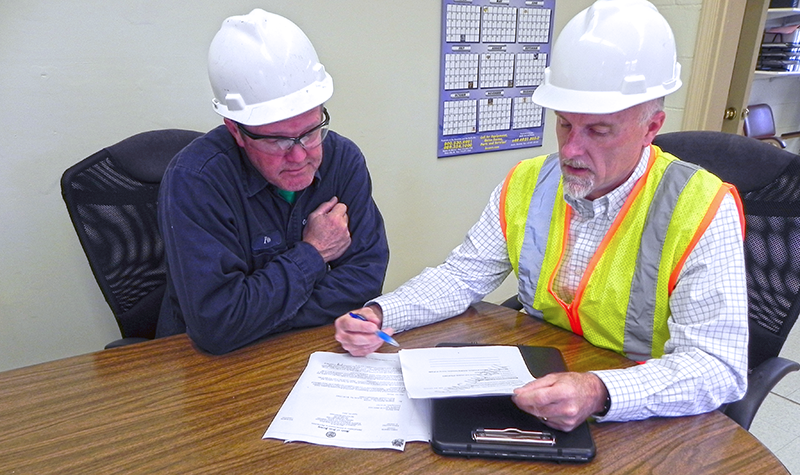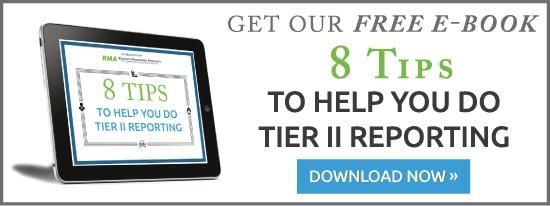Information on Tier II Community Right to Know Reporting & TRI Reporting in North Carolina.
Both Tier II Community Right-to-Know Reporting and TRI Reporting can be confusing. From what we've heard customers of ours tell us, there are so many aspects of reporting that sound similar or seem similar, that it's hard to keep track of them.
The issue is, when it comes to EPCRA Reporting, there's never been a time where you're under the microscope more than you are now. From 3rd party environmental groups getting aggressive, the cash-strapped governmental agencies cracking the whip, your operation needs to be 100% on top of these regulations, no matter what.
 TRI Reporting & CRTK Reporting Issues in North Carolina
TRI Reporting & CRTK Reporting Issues in North Carolina
When it comes to staying on top of these regulations, there's a ton of confusing, contradictory, or straight up wrong information out there.
Regulators use the terms chemicals, materials, mixtures, and compounds interchangeably, which is not only wrong but very confusing. Some folks call the terms different things, others call them annual chemical inventories, and others just call them EPCRA Reporting, which while correct, is like saying "I drive a car". Obviously, we know the difference between a Hyundai and a Lamborghini, so why not clarify what you mean?
We cover this topic more in-depth in our article TRI Reporting vs Tier II Reporting which I encourage everyone to check out to learn more about these subjects.
So, let's get into these two subjects and learn more.
.png)
TRI Reporting in North Carolina
TRI Reporting needs to happen at your location assuming the following conditions are met:
- Your operation is included in a covered North American Industry Classification System (NAICS) code.
- You have 10 or more full-time employees OR a total of 20,000 working hours or greater at your operation.
- This includes part-time employees, truck drivers, employees that work at multiple locations, etc.
- Your facility manufactures (defined to include importing), processes, or otherwise uses any EPCRA Section 313 chemical in quantities greater than the established threshold in the course of the previous calendar year. Some thresholds are 25,000 pounds, some are 10 pounds, some are a few ounces, so make sure you double check the USEPA's list to find out what applies to you.
TRI Reporting is overseen by the USEPA, so there's nothing specific for folks in North Carolina to worry about. Unlike some other states, North Carolina does not have any additional specific state requirements you need to be aware of. However, you do need to know that reporting can only be completed electronically via the internet over the USEPA's CDX (Central Data Exchange) software.
Other Names for TRI Reporting
We've heard it called every name under the sun, but these tend to be the most common:
- TRI Reporting
- Toxic Release Inventory Reporting
- EPCRA Reporting
- Form R Reporting
- Form A Reporting
- SARA 313 Reporting
- Section 313 Reporting
- SARA Title III Reporting
- SARA Title III Section 313 Reporting
Regardless of what you call it, it's all the same thing.
Additional TRI Reporting Information
While we're on the subject, here's some extra information you may find helpful on TRI Reporting.

Tier II Community Right-to-Know Reporting in South Carolina
Unlike TRI Reporting, Tier II CRTK Reporting is way more straightforward. I like to tell folks this is just a "snapshot" of your operation, and this information is useful in the hands of emergency responders.
The reason I say snapshot is because Tier II Reporting should reflect what your operation looks like on any standard day. Imagine if there's a fire at your operation. The local fire department would be able to pull up information about your operation and say they have tanks of chemical XYZ. This information helps your local community know what you have, so in the case of an emergency they can respond appropriately, or in the case of citizens, they can decide what they do (or don't) want to live near.
Remember a few years back there was that explosion at that fertilizer plant in Texas? Tier II Reporting lets your community know you have stuff on-site that could potentially be dangerous, and hopefully avoid accidents like what happened in Texas.
Let's look at the details of what Tier II Reporting is.
- You report on hazardous chemicals or materials you store on-site over the course of a year in excess of the reporting thresholds.
- Hazardous materials are any substance that has an associated SDS (previously MSDS) as per OSHA regulations.
- Reporting thresholds typically are 10,000 pounds. Extremely hazardous substances (EHSs) have a threshold of 500 pounds or the threshold planning quantity (TPQ), whichever is lower.
Once you determine if you have to report, you give your information electronically to:
- North Carolina Division of Emergency Management
- Local Emergency Planning Committee (LEPC)
- Local Fire Department
Pretty easy, but there are a few things to remember:
- The State of North Carolina requires Tier II Reporting through E-Plan online reporting software.
- No paper submittals are accepted at all.
- Many local fire departments and Local Emergency Planning Committees accept E-Plan as well, but there are some that require other ways to submit your information.
- In order to make sure that you're compliant with Tier II submission guidelines, we always recommend you contact your local fire department and LEPC to find out exactly what you need to do.
- While there is no official recommendation from the state, we usually tell our clients in North Carolina to keep records just in case. Either turn them into a PDF and save them or print them out and store them someplace safe. Keeping a few years worth of records is a best practice to ensure you always have copies just in case.
- There is a fee! Don't neglect that you have to pay based upon your reporting. It works like this:
- E-Plan will automatically calculate and generate your fee based upon the materials you enter in your report.
- The fee is calculated as such: $50 for every material you enter, and $90 for any EHS you enter.
- Fees are capped at $5,000 per facility. And there are exemptions from the fee, such as family farms, government facilities, retail gas stations, and a few other industries.
- Any chemical(s) you voluntarily report that are below the required reporting threshold will NOT be used when the fee is calculated, but will still show up on your reports.
- Fees MUST be paid online through E-Plan either using a credit card or an electronic check.
Other Names for Tier II CRTK Reporting
Remember we said we hear people call regulations this, that, and the other thing? Well, this regulation has a few names, but they all mean the same thing.
- Section 312 Reporting
- Tier II Reporting
- CRTK Reporting
- Community Right-to-Know Reporting
It's all the same reporting, the same regulation, and it's the same everywhere you go across the country.
Additional CRTK Reporting Information
Here are a few articles that may be of interest to help you with Tier II Reporting.
Closing thoughts on Community Right-to-Know & TRI Reporting in North Carolina
Our number one recommendation to everyone is this: stay educated on the subjects.
Our number two recommendation is: don't wait til the last minute. Make sure you know TRI Reporting & Community Right to Know Reporting Deadlines to ensure you stay ahead of the game.
And always, if you aren't sure what you're doing, get in touch with experts to find out more.












.png)


